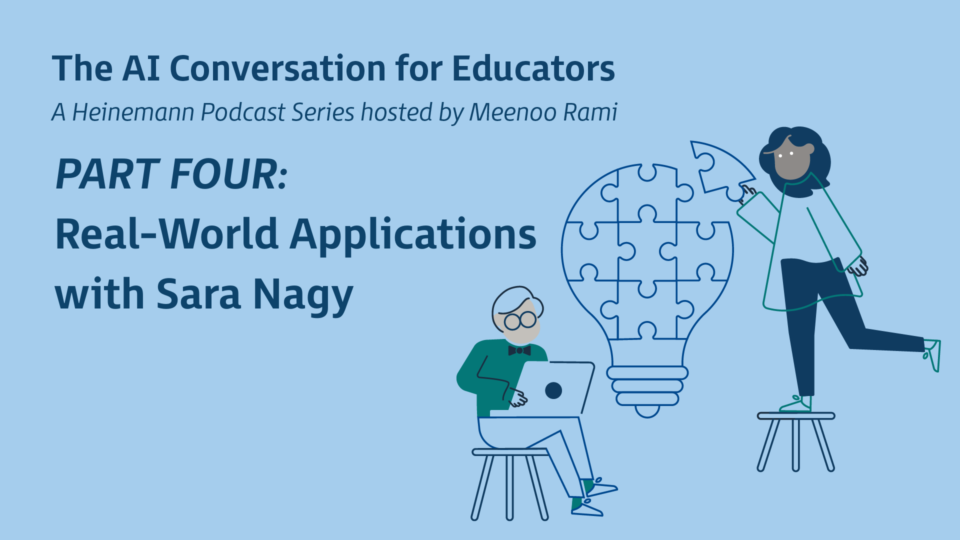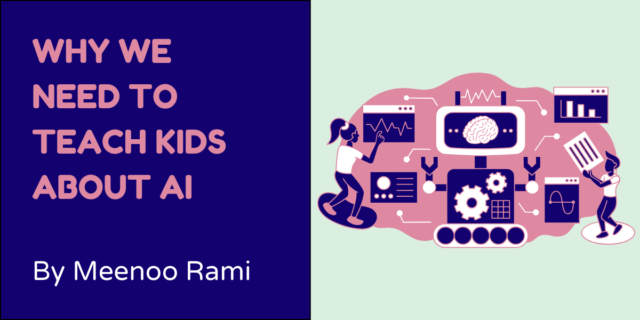
Welcome to The AI Conversation for Educators, A Heinemann Podcast Series hosted by Meenoo Rami.
This series for teachers explores how generative AI is transforming teaching and learning.
In this episode, Meenoo Rami speaks with Sara Nagy, who is a senior technology leader and a strong advocate for equity in tech literacy.
Together they discuss::
- the values she sees in successful teammates, all of which align with some of our highest goals for students, and how those values remain constant even as technology evolves
- practical insights into AI literacy
- common AI-related misconceptions
- why she believes the real power of AI lies in how we use it as a thinking partner, not a crutch
Transcript
Sara Nagy:
I focus on translating complex technology concepts and complex innovations into meaningful business outcomes. So that's mainly what I focus on. And if you want to dive into my connection to education, there's a couple of areas that comes from. So early on in my career, I worked with universities and ministries of education on things like widespread adoption of, back in those days, just getting personal computers and productivity applications across the globe. So things like Microsoft Windows and Office in the hands of all the students, so that was my first entrance into working with educators. And then later on I have focused and worked on up skilling, so things like AI and emerging technologies. I've built skilling modules and other content that can really help democratize those technologies and explain it in terms that everybody can understand.
Meenoo Rami:
Yeah. And this is the main reason why I wanted to request you to join this series because your experience has been so diverse, but there's always been this thread of ensuring that technology serves humans and especially young people. And I'm really excited that we get to talk about that impact of AI on educators and students.
Sara:
I would just add that beyond my work previously with educators, I'm super passionate, as you know, about mentoring and enabling the next generation of leaders. To me, the students of today are the leaders of tomorrow and the educators of today are shaping those leaders. So I want to give back and pay it forward.
Meenoo:
I'm wondering about what you think are some of the attributes of successful people on your team. What skills do you hope that students leave the classroom with in today's world, and what role does AI play in building those skills?
Sara:
I have this philosophy that I call the five C's, so clarity, curiosity, customer centricity, collaboration, and culture. So that's a lot, but I'll kind of break it down. Clarity, to me, are people who establish clear objectives and they have a really good communication mechanism where they are able to share a compelling vision of success. They inspire confidence and they can attract other individuals either to work for them or to follow their direction. So that's clarity. Curiosity, and I would add in there adaptability. So being curious. So people that don't just execute, they question, they explore, they evolve. And some of the most successful people I've seen are lifelong learners, like yourself, where you're trying to stay ahead of change and you're embracing change. So that's the adaptability piece. I think customer-centric focus drives success. And really I think the best innovations truly come from understanding what the problem is before jumping to building the solution.
So whether it's customers or internal teams, those who really lead with empathy and drive that clarity can make the biggest impact and focus on what is your customer. And again, the customer could be someone internally or it could be someone externally. And then collaboration, no product is built in silos, especially AI. The most successful people build strong networks, they break down barriers, they bring the right people together to drive change. And that kind of brings me to culture, culture sort of summarizes all of that. But really success, to me, is driven by leading by example. So demonstrate your own core values and show them in your actions rather than just talking about them. There's a lot of other attributes, but the five C's are kind of core to me.
And then you ask what skills do students need today? And I'm happy to talk about that and kind of where AI fits in. I think AI literacy is crucial. It's something that we can and should teach at all levels, just like we did with the internet. So regardless if you're in STEM or business or the arts, understanding how AI works, its strengths, its limitations, its biases, that's going to be fundamental. Then things like AI proficiency, so not just students but anybody who can harness AI effectively, whether it's coding or even just using AI-powered tools to augment work will have a competitive advantage. And then there's a lot of other skills too, but I think those are key things about AI.
Meenoo:
Absolutely. I think what really struck me about what you've said is how timeless these values are and how important it is to tie them to, whether it's the up skilling or the AI literacy that teachers who are listening to this podcast are trying to bring into their classroom and supporting their students with, they're listening and they're seeking out resources like this because they believe these things. They believe that they have an important role to play in the learning and the readiness of their students to not just enter college, but any workplace.
Sara:
Absolutely. Yeah, absolutely.
Meenoo:
Yeah. In your previous answer, you talked a little bit about understanding limits of AI or limitations of AI systems. There are a lot of misconceptions out there about AI. What do you think are some of the most prevalent misconceptions that maybe you encounter or your team has encountered? What do you wish people knew or understood better?
Sara:
I think one of the biggest misconceptions is that AI is going to replace humans entirely, and it's some magical all-knowing, all-encompassing entity. And the reality is AI is a tool and it's really only good as the data and the design behind it. And so I think we have to realize and remember it's a tool and use it as a tool. Another misconception is AI is objective. AI inherits biases from the data that it's trained on, so that's why another point I'll make is that ethical AI development is very important. We need transparency, we need diverse perspectives, we need governance that's very strong, and we need to make sure AI serves everyone equitably.
And finally, I wish that people understood that AI isn't just for tech experts. You don't have to be a data scientist to engage with AI. There's countless tools that allow non-professional and technical professionals that allow everyone, educator, students, even if you're not focused on coding, to use it in their work and learning. I use Microsoft Copilot almost every day as my AI assistant. I use it to scour documents, help me ideate. I even use AI tools to plan my family reunion last summer. So-
Meenoo:
Yeah.
Sara:
... use it as a tool.
Meenoo:
Absolutely. I love the idea that when you ensure that you understand it not as a magical thing but as a tool, then you can treat it like other tools you've already adopted or experienced. Can you talk a little bit about how you see advances in these technologies affecting things like education, workplace, and even society as a whole?
Sara:
Emerging technologies, especially AI, are really fundamental to how we learn, how we work, how we collaborate. And so if we think about education as an example, education is and can enable personalized learning. It can automate administrative tasks, so educators can focus on teaching and more important things. It can help students unlock new ways to think about how they do things, or it can help them with things like AI-driven tutoring or even things like AR/VR, augmenting some of the things that they might do. In the workplace we use it all the time. AI is augmenting all of us as humans. And, again, I use it to automate repetitive tasks, summarize data. It can help us with decision-making, like I'm using AI tools every single day to just help me think and refine my thinking. I'm not using it as a crutch, I'm using it as a way to expand and help me maybe think outside the box sometimes.
And so I think you have to, as we were talking before, you have to work alongside AI rather than thinking about how it's going to displace someone. As I mentioned earlier, the things that we're doing, especially with AI and scientific discovery, that's helping us with everything from healthcare to climate research for the society. So if you think about being able to utilize AI in these ways that help us comb through data, analyze, give us hypotheses in a variety of different things that might take us years to do, that's going to help us all better society in so many different ways.
Meenoo:
And what is so interesting and energizing about what you're saying is seeing AI as a partner and not necessarily a crutch. And the idea that these emerging technologies that seem so far-fetched now, the students of today are going to continue to shape it and use it and experience hopefully the positive outcomes of these advances that are happening right now. So that's really cool.
Sara:
Yeah. And you made a great point earlier which is the kinds of things we've been talking about. These are great skills regardless of the technology. Thinking about being adaptable, thinking about how technology evolves. AI is happens to be very prevalent in all we do, but what's the next AI and how do you have that mindset from an education perspective of replace AI with quantum, being maybe the next thing. Or whatever the next thing is, you need to be thinking about those types of skills are transferable regardless of the technology in terms of how you learn and how you educate yourself.
Meenoo:
And as someone who has seen so many technological advancements and trends come and go over your storied career, I think there's a lot of wisdom in what you're saying that the people who are always willing to learn, grow, and evolve are the ones who thrive in that kind of environment.
Sara:
Absolutely.
Meenoo:
Yeah. So we have a little tradition on this series where we just do some fun, rapid round questions. So what's the most fun you've had with AI, either in your work or in your personal life?
Sara:
I think just in general, what brings me joy or the most fun is what I call AI for good. AI, like I was saying before, help can help us and is helping us solve some of the most challenging problems in the world. So whether it's new materials for clean energy or accelerating drug discovery. Heaven forbid we have another pandemic, AI is helping scientists be able to accelerate that timeline in terms of discovery and shorten it into weeks and months versus decades. And so unlocking some of those potentials, to me, it's AI for good is where I find the fun and inspiration. That's where I really get inspired by AI.
Meenoo:
Yeah. And what is one thing you wish every educator would try with AI?
Sara:
I would just say experiment. I think there's a lot of AI tools, whether it be Copilot, there's ChatGPT, there's a million tools out there, and really it can help you with creativity, with writing, with a variety of things. And I saw this great LinkedIn article, I think it was yesterday or the day before, I'll have to find it for you. I thought it was really interesting because it was a speaker talking about education and worrying about how students might rely on AI to write papers for them. And one of the things they challenged the audience with... It went something like this, I'm not going to get it exactly right, but they said have your students use a tool like ChatGPT to write a paper and then have them bring it to class and then ask them without using AI to make it better. And I was like that's a great way to encourage your students-
Meenoo:
That's a great assignment.
Sara:
... to not shy away from the technology, but also do some of their own work while leveraging the technology. So I thought that was a very inspirational way to address the challenge that I think a lot of us have.
Meenoo:
And to evaluate where it works well and where it falls short because-
Sara:
Absolutely.
Meenoo:
... like you said, it's a tool and you have to evaluate its effectiveness as the user of it.
Sara:
Yeah, it's not perfect. You need human interaction.
About the Contributors

Meenoo Rami, author of Thrive, is a National Board Certified teacher who taught her students English at the Science Leadership Academy and other public schools in Philadelphia for ten years. Meenoo is a teacher-consultant for the National Writing Project. She has also worked as a teaching fellow with the Gates Foundation, where she led the portfolio to help teachers refine their practice through collaboration, and she has been a Principal Product Manager at Microsoft.

Sara Nagy is a senior technology leader with a 25+ year track record of driving innovation and customer success across cloud, AI, and emerging technologies.
Most recently serving as Senior Director of Customer Engagement at Microsoft, Sara led global efforts to accelerate customer and partner adoption of breakthrough technologies including AI, quantum computing, mixed reality, 5G, space technologies and more. Over her 26-year tenure at Microsoft, she held leadership roles across product development, technical sales, and business strategy for flagship products such as Azure, Windows, Microsoft 365, and Dynamics 365.
Sara’s early career included founding and running a small business in the Pacific Northwest, where she focused on operational excellence and growth strategy for service-based companies.
Passionate about mentorship and impact, she remains active in nonprofit leadership and community development efforts.
Outside of work, Sara enjoys snowboarding, downhill mountain biking, and Formula 1. She and her husband are avid collectors of sci-fi and pop culture movie memorabilia and enjoy sharing their collection with fellow fans.


